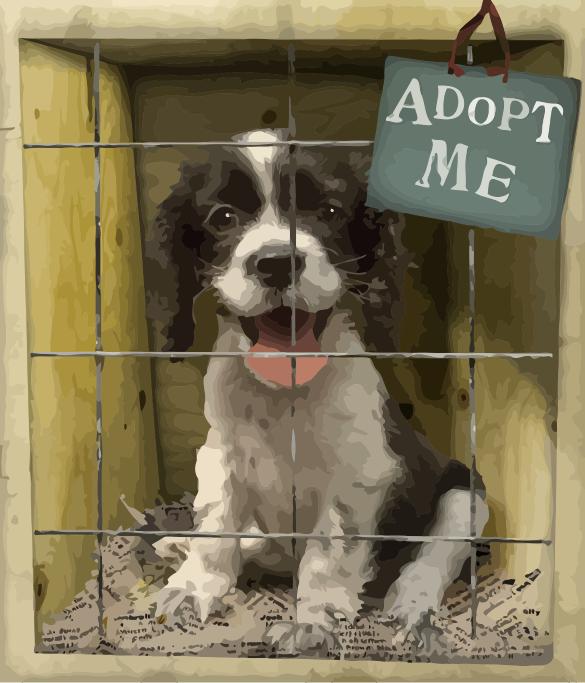Adopted Dogs and Their Problems

Before giving a new home to an adult dog, try to find out all you can about its previous home, what daily routine it is used to, and if it has any behavior problems. If it comes from an animal shelter, you may not be able to discover answers to all these questions. Some adopted animals have had a bad start in life, and will need particularly sensitive care and handling.
From the moment your new dog arrives home, it will learn what is expected of it through the signals you give out. If it has been allowed to “run the show” in its previous home, you must very quickly show it who is in charge. But very often an adult dog who has been ignored and neglected all its life and has never had any fun becomes introverted or fearful. If this is the case with your new pet, you will need to draw it out of its shell with kindness and confident handling, encouraging it to become more relaxed.
Do not force too much activity on a nervous or subdued dog. Give it a quiet place to retreat to, especially if yours is a noisy family home and the dog is used to quieter surroundings. Don't introduce it to too many strangers at once. Warn your friends and family that it'll need gentle handling and quiet, friendly encouragement until it has settled down.
If you have another dog, introduce them outside in the yard or garden or on neutral territory, preferably both off the leash. Don't make any move to interfere while they sniff around each other. Be sure to make a fuss of the original dog as well as the new one so that it doesn't fear that the newcomer is going to take over.
Establishing a Routine
It is important to establish a fixed feeding routine as quickly as possible. Don't change the dog's diet for at least the first week, to avoid digestive upsets. Make sure that the dog knows where it is expected to sleep. Show it where you wish it to relieve itself, but be patient if it doesn't get it right every time. Reward your dog when it does things correctly.
There is a real danger of adopted dogs becoming overattached. Restrain your natural desire to shower it with love 24 hours of the day—this may cause the dog to develop separation anxiety. Ensure that the dog spends short periods every day alone, gradually building up from 5 minutes to 3 or 4 hours if necessary. “Time-out” sessions, in an indoor pen or another room where it cannot do any harm, are a particularly helpful way of calming a boisterous dog, but make sure it has plenty of toys and chews to prevent it from becoming bored. Give it two 30-minute walks a day and spend time playing with it outdoors to use up some of its exuberant energy. Use an extendible leash and do not let the dog off it for the first few weeks. Although it seems obedient indoors, you may find its concentration sadly lacking when there are distractions such as people, other dogs, cats, joggers, and bicyclers about.
Q&A
We recently rescued a Border Terrier, Candy, from a shelter. She is very reserved with us. How can we make her more outgoing?
It's possible that Candy's previous owners ignored or mistreated her. You will need to gain her trust and give her time to settle. Many rescued dogs have never been taught to play. Try stimulating Candy with a squeaky toy (throw it, roll it, or pull it on a string toward her). If that doesn't work, wrap a ball in something smelly like a pair of dirty socks for her to investigate. Once she gets the idea of play, she should soon begin to relax.
We have just adopted an adult Newfoundland female, Saskia. She is usually friendly but growls fiercely when she is eating and can be quite menacing. She is always hungry and very thin, but the vet can find nothing physically wrong. How can we stop her mealtime aggression?
Give Saskia several small meals a day of a good-quality complete dry diet. Don't use the same bowl or feed her in the same place every time and never take her bowl away from her. Avoid hovering too close to her when she is eating. After a while try dropping small pieces of food such as cheese close to her bowl at the end of a meal. As she learns to expect them, she will begin to look forward to them arriving. She should stop warning you off coming near her bowl, her condition should improve, and her food guarding should cease.




Leave a Reply